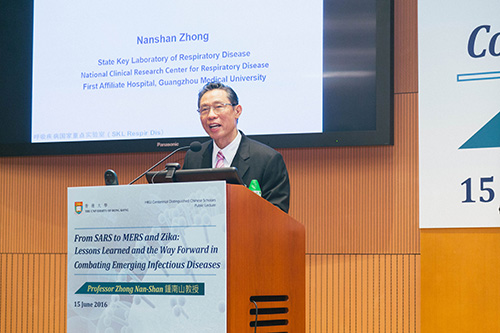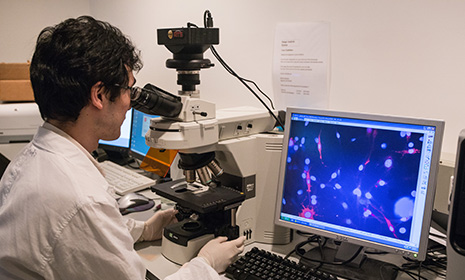Public lecture by Professor Zhong Nan-Shan on "From SARS to MERS and Zika: Lessons Learned and the Way Forward in Combating Emerging Infectious Diseases"
The School of Public Health of Li Ka Shing Faculty of Medicine of The University of Hong Kong hosts a public lecture by Professor Zhong Nan-Shan today (15 June 2016). As an academician of the Chinese Academy of Engineering, Professor of Medicine at Guangzhou Medical University, Director of the National Clinical Research Centre for Respiratory Disease and of the State Key Laboratory of Respiratory Disease, Professor Zhong has been appointed as HKU Centennial Distinguished Chinese Scholar in 2015/16. Professor Zhong’s lecture was on “From SARS to MERS and Zika: Lessons Learned and the Way Forward in Combating Emerging Infectious Diseases” and the lecture was attended by more than 300 participants from all walks of life.
As a leading figure in the combat of the SARS epidemic in China in 2003, Professor Zhong is revered as a fearless advocate for good clinical care and for a rapid and transparent response to the outbreak. More recently, Professor Zhong is again at the medical frontlines, leading his team in the fight against highly pathogenic avian flu H5N1, the pandemic H1N1 of 2009 and avian influenza H7N9. Professor Zhong is widely recognized for his contributions to the advancement of respiratory medical sciences and is a very influential figure in infectious disease control and respiratory medicine in China and internationally.
At the lecture, Professor Zhong recalled the various infectious disease crises in the past decades, including SARS, MERS-CoV, avian and swine influenza virus, Ebola, and most recently Zika, which have devastated the lives of thousands of people around the world. “Early identification of these novel pathogen and early diagnosis are the most important strategy in containing such emerging disease outbreaks. It took 139 days to identify the SARS coronavirus in 2003 but only 37 days to identify the H7N9 influenza virus in 2013, indicating a significant progress in the speed of detecting new pathogens over the last decade,” said Professor Zhong. He said that detection, diagnosis and quarantine at the very first instance are particularly critical for imported diseases such as H1N1, Ebola, MERS-CoV and Zika in controlling the transmission of such viral diseases across geographical borders.
For viruses with definite human-to-human transmission (e.g. SARS, H1N1 and MERS-CoV), Professor Zhong emphasized that quarantine of patients and strict protection of medical staff are crucial in keeping the spread of infections at bay. “There was no secondary infection among our medical staff who contacted the Korean patient infected with MERS-CoV during the patient’s one-month’s hospitalization in China in 2015”, said Professor Zhong.
Professor Zhong elucidated that the cessation of contact with life poultry and eradication of mosquitoes (aedine mosquitoes) may minimize the probability of the spread of infection for viruses with poultry- or mosquito-mediated transmission of infection. “Back in 2004, the prohibition of wildlife marketing in Guangdong province has proven to be effective in preventing the recurrence of SARS; during the outbreak of H7N9 infection, industry reform of the central breeding and central butchering had accelerated, which had subsequently reduced the incidence of H7N9 infections”, said Professor Zhong. Professor Zhong agreed that the HKSAR Government’s recent temporary suspension of live poultry trade due to the detection of H7N9 bird flu in a bird feces sample collected at one of the local markets was a prudent public health measure to prevent and control the spread of deadly viral diseases.
Apart from the strengthening of infection control measures and acceleration of reform of live poultry market industry practices, two other measures are also critical in preventing and controlling the spread of viral diseases. "Vaccination remains the best way in preventing emerging infectious diseases. In 2009, about 100 million people had received H1N1 vaccination, which had proved to be effective in warding off the deadly virus then," said Professor Zhong. Finally, participation, one element of the four "P"s of modern medical model, is essential for the government, medical professionals and citizens in combating emerging infectious diseases. "Honesty is all that counts for the government and media in minimizing fear of the public and transparency of information remains crucial in fighting battles with microbes," remarked Professor Zhong.
About the School of Public Health, Li Ka Shing Faculty of Medicine, HKU
The School of Public Health, Li Ka Shing Faculty of Medicine, HKUhas a long and distinguished history in public health education and high impact research. With world leading research in infectious diseases as well as on non-communicable diseases of both local and global importance, the School has made significant contributions through its research and advocacy to improve the health of populations and individuals, both locally and globally. The School is a leading research and teaching hub in public health on influenza and other emerging viruses, control of infectious and non-communicable diseases, tobacco control, air pollution, psycho-oncology, behavioral sciences, life-course epidemiology, and health economics, health services planning and management. This work has informed international (e.g. the World Health Organization, Food and Agriculture Organisation of the United Nations), national and local public health policies.
Media enquiries
For media enquiries, please contact Ms Stephanie Chau (Tel: 39179139) of the School of Public Health, Li Ka Shing Faculty of Medicine, HKU.

Professor Zhong Nan-shan, Director of State Key Laboratory of Respiratory Disease.

Professor Peter Mathieson, President & Vice-Chancellor of The University of Hong Kong, presents a souvenir to Professor Zhong.








.png)
